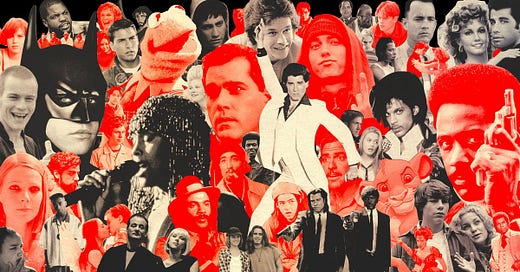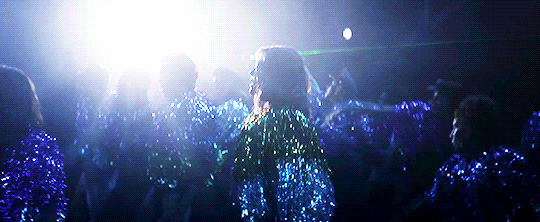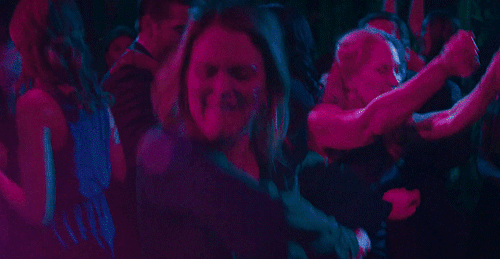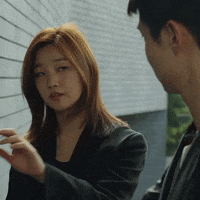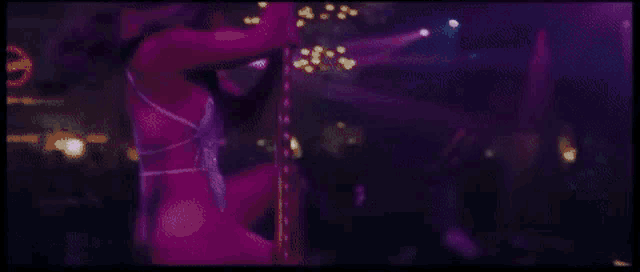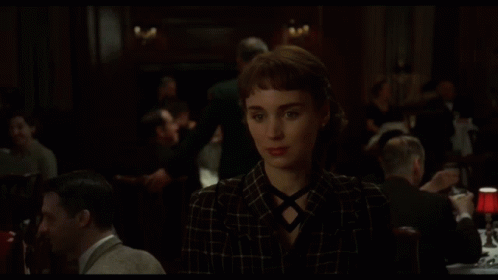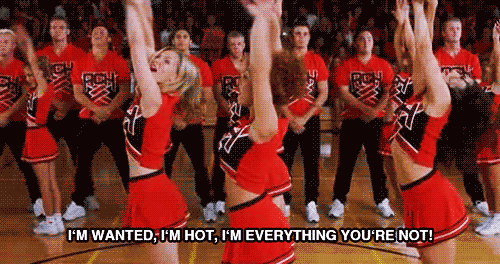In honour of tonight’s 95th Academy Awards, the first LOOSEY LIST is film-themed. Film has always felt like a first love as I think back to a childhood spent shoveling through stacks of allegedly pirated VHS tapes. Despite my affinity for the craft, I am never satisfied with my response when asked what my favourite movie is. I indecisively offer a short list of films only to continuously make amendments. Alternatively, I am more confident when discussing favourite scenes in cinema rather than favourite films in their totality.
There are plenty of elements that make a scene. Paramount is the screenplay, the genesis that begins in written form and morphs into something visual. Then, there are the actors and actresses who punctuate the script and humanize a screenwriter's text to breathe life into the characters. But for me, the secret sauce has always been the music as it binds these disparate elements into a cohesive medley. Good music selection in a film can evoke emotion while great music selection pushes the plot forward. It can foreshadow a character’s demise or signal a pivotal change in one’s development. When the music is spectacular, it envelops you in the director’s world only to teleport you back to the scene when the song finds your ear days, weeks and years later.
And so, I am pleased to present our first LOOSEY LIST: Music at the Movies, Significant Achievement in Music and Film 🍿🎶
Classic Man (Barry’s Version)
Originally emanating from the Houston hip-hop scene of the ’90s, the chopped and screwed genre is known for its slowed-down remixes that engross the listener into a drunken haze. Moonlight (2016) features a brilliantly lethargic, chopped and screwed remix of Jidenna's 'Classic Man' at one of the most poignant points of the film to further characterize the protagonist. Throughout the film, Black masks his feelings, oscillating from craving love and affection to desiring invisibility and protection #bar. When Black reconnects with a past love interest (Kevin) in one of the final scenes, we encounter this obfuscation again. Instead of articulating his lingering feelings when Kevin asks for an explanation for his sudden appearance, we observe Black dodge and crank up the remix of ‘Classic Man’ in his car to fill in for his silence. In doing so, Black drowns the audience into his sedated emotions much like a red solo cup of sizzurp.
Upon replay, I noticed that the song’s lyrical content is synonymous with the masculine figure Black has strained to embody throughout the film:
“I'm a classic man. Your needs get met by the street, elegant old-fashioned man.”
Black desperately wants to be seen as a normal, “classic” man. To Black, a classic man is a man who is respected, who is strong and who is a provider, qualities that have evaded him for the majority of the film. However, director Barry Jenkins’s choice to include the chopped and screwed remix of the track, and not the original, reveals Black’s hand. Yes, the Black we encounter in the final act of the film has built himself into the classic man he aspired to be but something is askew. To achieve this final form of masculinity it is evident that something has been severed or tinkered with. Perhaps, the track is not the only thing that has been chopped and screwed but also Black’s soul.
Sebastián Lelio and his dazzling discoteca
If Sebastián Lelio is going to give you one thing, he’s going to give you a glitzy dancefloor sequence in a film. His capacity to marry pulsating strobe lighting with shimmering sound design and choreography has him slated to be a LOOSEY Top Pick for the RENASSIANCE visuals if we ever get them. Take the cosmic discoteca scene in his Academy Award-winning A Fantastic Woman (2017). What Lelio captures so exquisitely is how the dancefloor can yank you from the darkest of depressions or, at least in this film’s protagonist's case, distract you from it. Marina is grieving the sudden loss of her lover and slips into a nightclub to feel and not feel at the same time. Partway through the scene, we witness her magnificently transition into a fully choreographed dance break equipped with backup dancers, a costume change and vibrant makeup.
Signalling a departure from reality, the juxtaposition of Marina’s shaken demeanour to her powerful, self-centering denouement illustrates how healing the dancefloor can truly be. You can tell that homegirl really needed this.
A more deliberate vision of escapism on the dancefloor is depicted in Lelio’s Gloria (2013) / Gloria Bell (2018) films. I have only seen the latter, the English remake with Julianne Moore, but was instantly transfixed with Moore’s ability to communicate the carefree confidence that comes with not giving a [redacted] about how you look when you’re dancing. When you are really losing yourself and not concerned with dancing with anybody but your own body. My favourite dancers have never been classically trained or overly concerned with hitting all of the dance moves. Instead, I admire dancers who move to an internal rhythm that is in opposition to the most viral dance move and, sometimes, in opposition to the beat yet attuned to themselves. Rihanna, who has never been too obsessed with hitting choreography, does this masterfully. Unbothered, she seemingly adlibs dance moves on the fly, gyrating to the beat of her own drum. For Rihanna, this works as her blasé bounce somehow gives you the most while appearing to do the very least. Now, I never thought I’d compare Rihanna’s dancing to Julianne Moore’s but, in Gloria, what Moore’s character lacks in conventional skill, she makes up for in badassery.
My favourite dance scene in the movie features Moore doing a flirty shoulder shimmy to Anita Ward’s ‘Ring My Bell’ but it's unfortunately not online. Instead, I will leave you with the equally liberating closing scene that radiates with a bossed-up divorcée energy that I will bring to dancefloors all summer. I implore you to do the same.
The Jessica Jingle
From the film’s outlandish fusion of thriller and comedy genres to its whipsmart allusions to class dynamics, Parasite (2019) was the OG “Eat The Rich” Bod Gyal before any of the other girlies (Triangle of Sadness, The Menu, The White Lotus) popped up. Somewhere wedged in the two-hour and twelve-minute cinematic chimera is a sixteen-second jingle that has taken out a lease in my brain for the past four years. Known to the internet as The Jessica Jingle, Jessica, of the Kim family, leverages the following playful verse to memorize her identity prior to meeting the Park family:
“Jessica. Only child. From Illinois, Chicago. I’m a classmate of your cousin.”
The employment of a cute jingle to assist in a fraudulent scam is a model metaphor for a plot that notions that beneath the innocuous and innocent lies something much more sinister. Bravo, Boon Jong-ho.
Nicholas Brittell has the range that some of you think Jack Antonoff possesses
Listen. I love me some Hans Zimmer but I am Nicholas Brittell HIVE BOOTS DOWN THE HOUSE. The range this man has. I was admittedly not fully dialed in until hearing his beautiful ‘Agape’ in Jenkins’s If Beale Street Could Talk (2019). The fluttering horns are akin to the heart palpations one feels when romanticizing a new crush while the solemn piano foreshadows a looming heartbreak. When paired together, it’s audio foie gras. In Larissa Pham’s Pop Song, she has a quote from her friend Clare that reads “what’s the point of a crush that doesn’t ruin you.” I think if this quote were a song, it would be ‘Agape.’ I can’t tell if it’s supposed to make me happy or sad, mournful or hopeful but I think that duality is what makes it so emblematic of blossoming love.
But for this man to give us ‘Agape’… and drop the Succession theme song (technically not a film but we keep things loose on LOOSEY) in the same year? The cheek! The nerve! The gall! The audacity and the gumption! It’s one of the few HBO theme songs that I do not skip. It possesses the same duplexity of ‘Agape’ as the instrumentation pairs diametrically opposed elements, in this case: a pretentious, old-money-sounding piano and brash percussion that could be pulled from Nas’s Illmatic. This juxtaposition spells it out clearly: Logan Roy is a gangsta, don’t fuck with him. It is the perfect primer to the white-knuckled, white-collar, white-people-pilled opulence of the show. Hell, the beat is so tough that it even willed hip-hop supervillain Pusha T to jump on. The Academy needs to stop playing in Brittell’s face and run him his Oscar immediately.
J.Lo and Fiona Apple in the same cinematic universe
I don’t want to spend too much time on this one because the work speaks for itself but, in 2019, I did not have J.Lo stripping to Fiona Apple’s ‘Criminal’ on my bingo card. Did you? I love it when the music selection of a film feels like a wink to the audience and, in the case of Hustlers (2019), the wink is so obvious that it almost breaks the fourth wall. For the film to begin with Ramona (Jennifer Lopez) performing to a track that likens criminality to taking advantage of a lover to finishing with her becoming an actual criminal for leading a gaggle of strippers to drug and rob frothing finance boys? Chef’s kiss. It’s a foreshadowing so heavy-handed it’s next to ‘The Rains of Castamere’ being played at the Red Wedding. A different kind of massacre.
Ending strong on Cate Blanchett’s winning smile
I couldn’t leave you without some Blanchett to step to. Typically, if someone tells you their favourite part of the song is when it’s done… that’s a bad thing. However, the impact of the score in the final scene of Carol (2015) is only truly realized when the screen fades to black. Every element of its orchestration operates in concert with the cinematography, the expression of the actresses and the set design. The score of Carter Burwell (composer for The Big Lebowski, The Banshees of Inisherin, and the Twilight series to name a few) leads you to a cliff of sweltering emotion and when you have the sense to look how close you are to the edge, you’ve already lost your footing. We watch and listen as Therese toes through a restaurant in which Carol dines, the haunting strings and piano raising the stakes for their reunion. When their eyes finally meet, you hear a horn and harp conversing back and forth, first timidly and then confidently. It resembles the small talk two old friends or past lovers offer up in the beginning stages of a conversation to test if the waters are steady enough to dive into the deeper bits. In Carol and in life, a look can be a secret language between two people which is why the cinematography in this scene is an essential scene partner to the music. As we watch Carol from Therese’s point-of-view, the handheld camera is shaky, signifying her emotional fragility. Correspondingly, when observing Therese from Carol’s perspective, the vantage point is unwavering as it confidently pans out. With this, Burwell’s orchestration becomes less of a film score and more of an incantation that conducts the two lovers together by an invisible string. Lydia Tár would be shook.
Honourable Mentions
Bring It On’s Opening Scene - I mean, because: duh.
Pulp Fiction’s Twist Contest - The opposite of the blite dancing highlighted in Gloria Bell but iconic nonetheless.
Dream Girls’s ‘Step Into The Bad Side’, precisely the part when the ‘girls’ come out on stage and OWN
Inception’s ‘The Dream is Collapsing’ - We still respect you, Hans!
The Wiz’s Emerald City Scene - I know Solange has this on her mood board.


